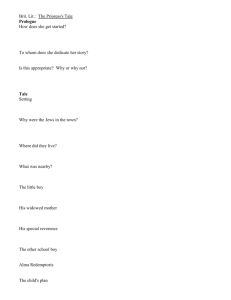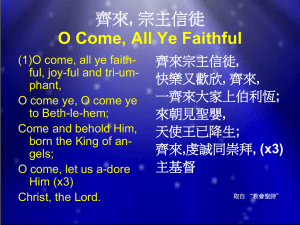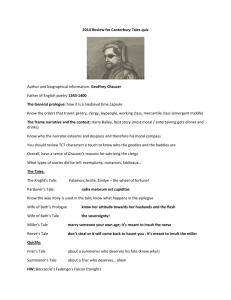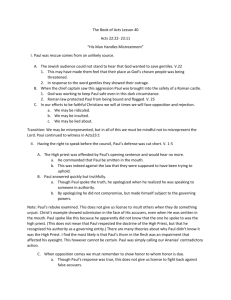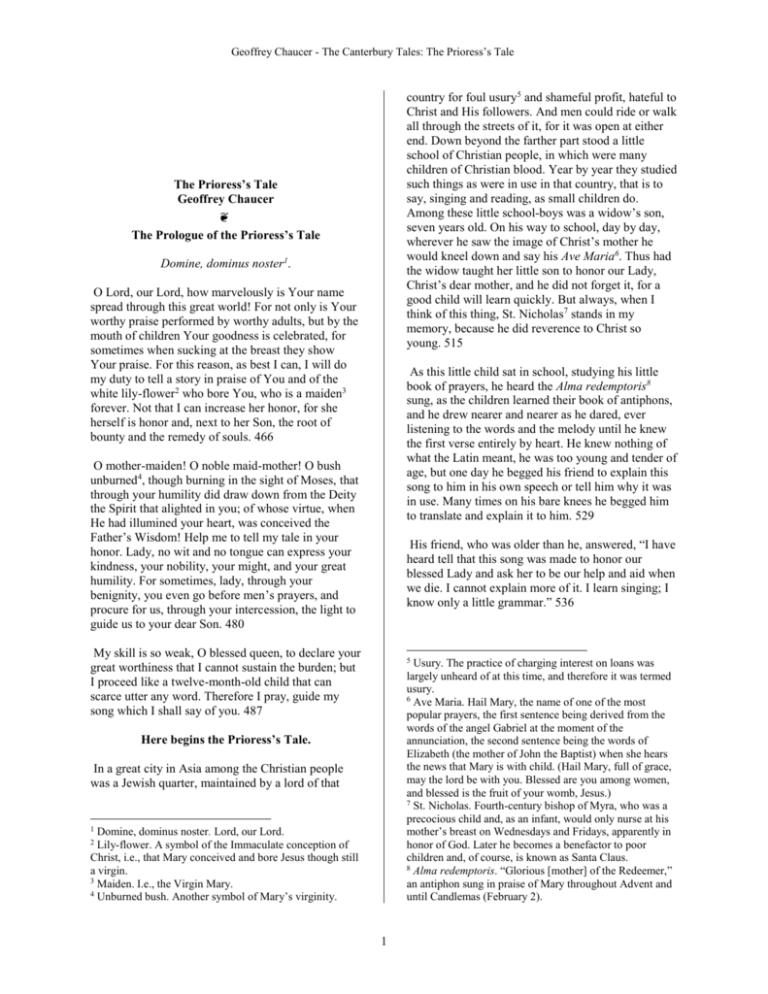
Geoffrey Chaucer - The Canterbury Tales: The Prioress’s Tale
country for foul usury5 and shameful profit, hateful to
Christ and His followers. And men could ride or walk
all through the streets of it, for it was open at either
end. Down beyond the farther part stood a little
school of Christian people, in which were many
children of Christian blood. Year by year they studied
such things as were in use in that country, that is to
say, singing and reading, as small children do.
Among these little school-boys was a widow’s son,
seven years old. On his way to school, day by day,
wherever he saw the image of Christ’s mother he
would kneel down and say his Ave Maria6. Thus had
the widow taught her little son to honor our Lady,
Christ’s dear mother, and he did not forget it, for a
good child will learn quickly. But always, when I
think of this thing, St. Nicholas7 stands in my
memory, because he did reverence to Christ so
young. 515
The Prioress’s Tale
Geoffrey Chaucer
❦
The Prologue of the Prioress’s Tale
Domine, dominus noster1.
O Lord, our Lord, how marvelously is Your name
spread through this great world! For not only is Your
worthy praise performed by worthy adults, but by the
mouth of children Your goodness is celebrated, for
sometimes when sucking at the breast they show
Your praise. For this reason, as best I can, I will do
my duty to tell a story in praise of You and of the
white lily-flower2 who bore You, who is a maiden3
forever. Not that I can increase her honor, for she
herself is honor and, next to her Son, the root of
bounty and the remedy of souls. 466
As this little child sat in school, studying his little
book of prayers, he heard the Alma redemptoris8
sung, as the children learned their book of antiphons,
and he drew nearer and nearer as he dared, ever
listening to the words and the melody until he knew
the first verse entirely by heart. He knew nothing of
what the Latin meant, he was too young and tender of
age, but one day he begged his friend to explain this
song to him in his own speech or tell him why it was
in use. Many times on his bare knees he begged him
to translate and explain it to him. 529
O mother-maiden! O noble maid-mother! O bush
unburned4, though burning in the sight of Moses, that
through your humility did draw down from the Deity
the Spirit that alighted in you; of whose virtue, when
He had illumined your heart, was conceived the
Father’s Wisdom! Help me to tell my tale in your
honor. Lady, no wit and no tongue can express your
kindness, your nobility, your might, and your great
humility. For sometimes, lady, through your
benignity, you even go before men’s prayers, and
procure for us, through your intercession, the light to
guide us to your dear Son. 480
His friend, who was older than he, answered, “I have
heard tell that this song was made to honor our
blessed Lady and ask her to be our help and aid when
we die. I cannot explain more of it. I learn singing; I
know only a little grammar.” 536
My skill is so weak, O blessed queen, to declare your
great worthiness that I cannot sustain the burden; but
I proceed like a twelve-month-old child that can
scarce utter any word. Therefore I pray, guide my
song which I shall say of you. 487
5
Usury. The practice of charging interest on loans was
largely unheard of at this time, and therefore it was termed
usury.
6 Ave Maria. Hail Mary, the name of one of the most
popular prayers, the first sentence being derived from the
words of the angel Gabriel at the moment of the
annunciation, the second sentence being the words of
Elizabeth (the mother of John the Baptist) when she hears
the news that Mary is with child. (Hail Mary, full of grace,
may the lord be with you. Blessed are you among women,
and blessed is the fruit of your womb, Jesus.)
7 St. Nicholas. Fourth-century bishop of Myra, who was a
precocious child and, as an infant, would only nurse at his
mother’s breast on Wednesdays and Fridays, apparently in
honor of God. Later he becomes a benefactor to poor
children and, of course, is known as Santa Claus.
8 Alma redemptoris. “Glorious [mother] of the Redeemer,”
an antiphon sung in praise of Mary throughout Advent and
until Candlemas (February 2).
Here begins the Prioress’s Tale.
In a great city in Asia among the Christian people
was a Jewish quarter, maintained by a lord of that
1
Domine, dominus noster. Lord, our Lord.
Lily-flower. A symbol of the Immaculate conception of
Christ, i.e., that Mary conceived and bore Jesus though still
a virgin.
3 Maiden. I.e., the Virgin Mary.
4 Unburned bush. Another symbol of Mary’s virginity.
2
1
Geoffrey Chaucer - The Canterbury Tales: The Prioress’s Tale
“And is this song made in honor of Christ’s
mother?” said this innocent one. “Now I will do my
duty, surely, to learn it all before Christmas is past.
Even if I will be scolded for not learning my own
lessons, and beaten thrice in an hour, I will learn it in
honor of our Lady.” 543
with her face pale from fear and anxiety she sought
him at school and elsewhere, until finally she learned
that he was last seen in the Jewish section. With
mother’s pity in her breast, as if half out of her mind
she went to every place where she supposed it likely
to find her little child, and ever she called on Christ’s
mother, the meek and tender; and at length she
sought him among the cursed Jews. 599
On the way home from day to day his friend taught
him secretly until he knew it all by heart, and then he
sang it boldly and well word for word following the
melody. Twice a day it passed through his throat, as
he went to school and home again through the Jewish
section, always singing and crying so merrily O alma
redemptoris. His mind was set ever upon our Lady;
the sweetness of Christ’s mother had so pierced his
heart that to pray to her he could not cease his singing
on the way. 557
She questioned every Jew that dwelt there and
prayed them piteously to tell her if her child had
passed by. They said “No.” But Jesus through His
grace presently put it into her mind that she cried out
to her son, where he was cast in the pit beside the
road. 606
O great God Who performs your praise by the mouth
of innocents, behold here your power! This gem of
chastity, this emerald, and this bright ruby of
martyrdom, where he lay with his throat cut, he
began to sing Alma redemptoris so loudly that the
entire place rang. The Christian people passing
through the street came to marvel upon the deed and
in haste sent after the magistrate. He came there and
did not delay, and praised Christ, the King of heaven,
and His mother as well, the glory of mankind. And
then he ordered that the Jews should be bound. With
piteous lamentations the child was taken up, ever
singing his song, and carried to the nearest abbey
with a great and noble procession. 624
Our first foe, the serpent Satan, who has his wasp’s
nest in the Jewish heart, swelled up and said, “O
Hebrew people, alas, is this honorable to you that
such a boy shall walk at will in spite of you and sing
of such matter as is against the reverence due your
faith?” 564
From this point on the Jews conspired to drive this
innocent one out of the world. To this purpose they
hired a murderer who took up a secret place in an
alley, and as the child went by, this cursed Jew seized
and held him tight, and then cut his throat and cast
him into a pit. I must say that they threw him into an
outhouse, where these Jews purged their bowels. 573
His mother lay by the bier swooning; scarcely could
the people draw this second Rachel12 away from the
bier. The magistrate ordered each one of the Jews
who knew of this murder to be murdered in torment
and by a shameful death, and immediately. No such
cursedness would he tolerate. He who deserves evil
shall have evil. Therefore he had them drawn with
wild horses and after that hung them, according to the
law. 634
O cursed race of modern Herods9, what good is your
evil intent? Murder will be revealed, truly it will not
fail, and chiefly where it touches the honor of God.
Blood cries out on your cursed deed. O martyr made
strong in virginity (the Prioress cried), now may you
sing, following always the white celestial Lamb10. St.
John, the great evangelist, wrote of you in Patmos11,
and said that they, those who never knew women in
the flesh, go before the Lamb and sing an ever-new
song. 585
Upon his bier before the chief altar this innocent one
lay all the while the mass went on, and then the abbot
and his convent hastened to bury him. But when they
sprinkled holy water on him, the child spoke again,
and sang, O Alma redemptoris mater! This abbot, a
holy man, as monks are (or else ought to be), began
to entreat this young child. “O dear child, I beseech
you, in the name of the holy Trinity, tell me why you
sing, since to my eyes your throat is cut.” 648
This widow waited all that night for her little child,
but he did not come. Therefore, as soon as it was day,
9
Herods. A line of Herods served as King of Judea, most
notably Herod the Great who reigned at the time of the
birth of Christ and ordered the execution of all the newborn Jewish males. His part on the medieval stage was a
remarkable one, as, following the historical records, he was
portrayed as a madman. See Chaucer’s Miller’s Tale, line
3384.
10 Lamb. I.e., Christ, the Lamb of God.
11 St. John . . . Patmos. The reference is to John’s vision in
the Book of Revelation, or Apocalypse.
12
Rachel. Biblical mother who was likewise inconsolable
at the death of her children. Matthew 2:18 names her as one
of the mothers of the innocents slaughtered at the command
of Herod.
2
Geoffrey Chaucer - The Canterbury Tales: The Prioress’s Tale
“My throat is cut to my neck-bone,” said this child,
“and in the course of nature I should have died, yes,
long ago. But as you will find in books, Jesus Christ
will have His glory remain and be remembered.
Therefore, in honor of His dear mother, I still may
sing loud and clear O alma. I always loved Christ’s
sweet mother, this well of mercy, as best as I knew
how; and when I was about to lose my life, she came
to me and told me to sing this anthem in my death, as
you have heard, and as I sang it seems to me she laid
a grain on my tongue. For this reason I sing and sing
I must in honor of that blessed noble maiden until the
grain is taken from my tongue. And afterward she
said to me, ‘My little child, now will I come for you
when the grain is taken from your tongue. Be not
afraid; I will not forsake you.’” 669
This holy monk, the abbot I mean, drew out the
child’s tongue and took off the grain, and he softly
yielded up the spirit. When the abbot saw this marvel,
his salt tears trickled down like a shower, and he fell
flat upon the ground and lay still as if he had been
bound. The convent as well lay weeping upon the
pavement, blessing Christ’s dear mother. At length
they rose and went forth and took this martyr from
his bier, and enclosed his little sweet body in a tomb
of pure marble-stones. He is there now, God grant
that we may all see him 684
O young Hugh of Lincoln13, slain also by cursed
Jews, as all men know (for it is only a little while
ago), pray also for us, sinful unstable people, that
God in His mercy may multiply His grace upon us in
reverence of His Mother Mary. Amen. 690
Here is ended the Prioress’s Tale.
Translated and Edited by Gerard NeCastro
© Copyright, 2007, All Rights Reserved
Citation. Chaucer, Geoffrey. The Prioress’s Tale. NeCastro,
Gerard, ed. and trans. eChaucer:
http://www.umm.maine.edu/faculty/necastro/chaucer
13
Hugh of Lincoln. A child who was reportedly murdered
during the reign of Henry III, who executed nineteen Jews
for the murder in 1255. A contemporary ballad, “Sir Hugh
or the Jew’s Daughter,” retells the story.
3

